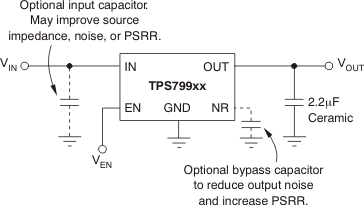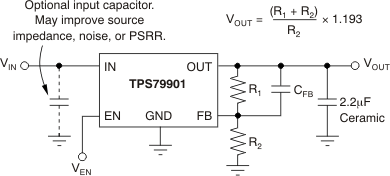ZHCSOY3L January 2005 – February 2022 TPS799
PRODUCTION DATA
- 1 特性
- 2 应用
- 3 描述
- 4 Revision History
- 5 Pin Configuration and Functions
- 6 Specifications
- 7 Detailed Description
- 8 Application and Implementation
- 9 Power Supply Recommendations
- 10Layout
- 11Device and Documentation Support
- 12Mechanical, Packaging, and Orderable Information
封装选项
机械数据 (封装 | 引脚)
散热焊盘机械数据 (封装 | 引脚)
- DRV|6
订购信息
8.2 Typical Application
Figure 8-1 and Figure 8-2 show the basic circuit connections.
 Figure 8-1 Typical Application Circuit for Fixed Voltage Versions
Figure 8-1 Typical Application Circuit for Fixed Voltage Versions Figure 8-2 Typical Application Circuit for Adjustable Voltage Version
Figure 8-2 Typical Application Circuit for Adjustable Voltage Version